- Home
- Rosanne Hawke
Zenna Dare Page 12
Zenna Dare Read online
Page 12
Dad looks up. ‘You’ve done all this?’ I nod.
‘I haven’t typed them all yet, and they’re not in order.’
‘You know what date this is?’
‘No. It’s one of the hard ones. And even the ones I’ve dated are not necessarily when she wrote them. Most of the Cornish ones are like she’s looking back, as if she wrote them later, like an autobiography, so I reckon she wrote most of them here in Kapunda.’ I show him the others where I’ve basically worked out the sequence. ‘I know she came here in 1849, so anything written about Kapunda is going to be around then, and before 1852 when she finally married Redvers. There are a few letters which help date some of the Cornish ones. She must have started singing
lessons around early 1845 because she mentions a March fair. I looked it up on the Internet — the March Fair wasn’t held every year — 1845 was the closest, considering she mentions she’s sixteen. And if she was Zenna Dare she was in her first production late in 1846.’ I show him the page off the ‘net about the Cinderella opera and The Bohemian Girl.
There’s open admiration in Dad’s face now. Even Kate has let her mouth gape. ‘So it could all fit?’
I nod vigorously this time. ‘And I want to find out if it’s true. Dad, I’m not being morbid. Please don’t tell Aunt Dorie.’ I don’t mention how I feel I have to find out. To put something right. He’d say how can you put something right after 160 years? What’s done is done. Caleb says finding out something, acknowledging it, starts a process of healing. Like an open sore finally gets a scab on it — there’ll always be a scar but at least it doesn’t bleed anymore.
Dad’s eyes narrow slightly. ‘Aunt Dorie?’
‘She won’t understand. She thinks we should leave the past alone. You don’t mind me finding out, do you?’
The hesitation is slight, enough to make me hold my breath. ‘S’pose not. But I’d like to be kept posted.’ Then he offers money — photocopying and expenses. I’m in the middle of saying thanks when he gets onto this obsessive thing. ‘No need to spend too much time on it, Jenefer.’
It’s afterwards when the kids are doing their teeth that he tells me this is Kate’s and Hamilton’s ancestry too. Kate’s interested — is there anything I can think of that she can share in? I go down the hall to their rooms; carry Hamilton into Kate’s bed and start telling them a story. About a girl called Gweniver who could play a lute and always wanted to sing. Who loved roses and words, did embroidery and literature in school and had a brother called Georgie.
After Hamilton is asleep, Kate asks me. ‘I want to help, Jenfa. I like Gweniver too. She has a pretty name. Dad told me it means the same as yours.’ She’s slightly peeved again and I’m quick to tell her how special the name Kate is. It’s when I’m vacantly gazing at her school drawings on the wall that I suddenly think of something she can do. ‘How would you like to draw pictures?’
‘What of?’
‘Gweniver. Cornwall. The mine. You could get stuff off the web. Bet there’s loads of info in your library at school about Kapunda. Cornwall too, since so many of the immigrants here were Cornish.’ I have every confidence in Kate’s abilities. I couldn’t do half the stuff at ten that she can do. Her eyes are glistening. When that happens with Kate, it’s usually excitement; it rolls her forward like a train with faulty brakes going down a slope. ‘Really? We could make it into a book for the family.’
That stops me short for a bit. I’m thinking History assignment but I could make another copy. ‘Kate, let’s keep it in the family too. We don’t need the whole of Kapunda knowing about everything just yet.’
She nods wisely. At least wait until we find out what Gweniver’s secret was, I say to myself. I get an uneasy feeling in the pit of my stomach lately that something so carefully hidden as that box had to be hidden for a good reason.
Hamilton’s warm and floppy as I carry him back to his blue room. Then I go back down to mine. Dad said I could keep the box here considering I was the one who found it. It’s in my bay window. No need to hide it now and I start deciphering another page.
Oh why, Gweniver? Why didn’t you want to marry Redvers?
Gweniver
Kapunda, 1851
I see a lily on thy brow,
With anguish moist and fever dew;
And on thy cheek a fading rose
Fast withereth too.
‘La Belle Dame sans Merci’,
John Keats 1795–1821
What could have possessed me to accept Mr. Tremayne’s invitation to the ball at Anlaby last night? Even Mary encouraged me, and Mrs. Orchard; she has left no doubt as to what she thinks about it all. She even lent me a shawl and gloves. Mary has helped me make a new dress so I did not have to wear my black. It was just like years ago when we would have dances on the green at fairs on Midsummer’s Day.
Mr. Tremayne had borrowed a buggy and I do believe it is the first time I have been in a vehicle like that since those jaunts with Mr. Drew and his parties in Penzance and singing in the Assembly Rooms at Truro. I must not dwell on those days and the times afterwards but often I wonder how many others he served as he served me.
I am not deserving of Mr. Tremayne’s attentions, however, and I think I will have to tell him why. He seems to take no notice of hints towards that direction at all. At Anlaby last night I was torn in two. Miss Buchanan was so kind as to invite us at all; there were so many fashionable folk present including the set of young people that do many things together. If only they knew that I too had been part of such a select group.
The room underneath the house had been gaily decked out with roses and white lilacs. It was so pleasant and cool underground that it was not as much a hardship dancing in this climate as I thought it would be. I had no idea Mr. Tremayne with his chapel-going would even enjoy such an evening, yet enjoy it he did. The only difference between him
and the other young men was that he did not drink the wine or punch on offer. He even danced with me although he did not hold me too closely. Mr. Tremayne is such a paradox; even though he will not touch alcohol, he has been seen walking into the Sir John Franklin public house to see a friend. Yet most other non-conformists would shun such a practice in case it was misunderstood.
Last night, he seemed so happy and young at heart. I ruined all that, of course. It was when he took me out to the gardens.
‘It is so beautiful here,’ I said at first. It did not quite explain the feeling I had; the moon shining, the roses scenting the air, and yes, Mr. Tremayne’s charm was not wasted on me either but I had to keep guard against that. He tucked my arm through his as we made our way down the steps to the rose bower below. Even in the moonlight I could see the whiteness of the tiny roses. They tugged at my heart long before he started speaking.
‘Miss Rundle, I want to ask you something tonight.’ And I felt the immediate premonition: fear. I should not have come. Yes, I should have known.
‘Mr. Tremayne —’ Somehow I had to put him off, change the pattern of his thoughts.
‘Please — we have shared so much over the last year.’ His voice was warm, caressing. How was I going to withstand him? I groaned inwardly, but of course he knew nothing of my torment. He carried on talking. ‘Helping at the school, those Sabbath School picnics at the Willows.’ He laughed then, remembering something, while I only grew more afraid. ‘And Baker’s Flat.’ He turned to face me, moved in closer. ‘I think that is when I was sure. Just the way you listened to the young Irish women in those dreadful hovels the mine calls cottages. The way you helped with the sick children. I haven’t seen that done before except in a condescending way. I admire you greatly, Miss Rundle.’ He stopped for a moment. ‘No, it is more, much more. I love you. Please, I would like us — to marry. I know God can only smile upon our union.’
How could I tell him? I should be happy if circumstances were different. How gladly I would have married Redve
rs Tremayne, but, alas, I could not. And I said it aloud.
‘I cannot. Cannot marry you. Please believe me. I am not worthy of a man of your calling.’ What more could I say without spelling it out? In the dark I could imagine him frowning, heard it in his voice as he objected. ‘I don’t understand. What do you mean, you cannot marry me? You do not care? I thought I could see it — in the way you regarded me sometimes ...’ his voice trailed away. I could not tell if it was in hurt or anger.
I moved away. ‘No. It is not you.’ Not you. I felt like screaming, I love you too. I will marry you regardless but will you still respect me when you find out? Will love turn to hate? I do not think I could bear the shame.
‘If it is not me, what then? You have promised someone else?’
‘No.’
‘What can stop you? You’re already married? If you’re a widow, it makes no difference to me, Gweniver.’ I could not bear the sudden hope in his tone, but Redvers Tremayne would always have hope. Yes, that is it, I thought. He has his faith and hope; he will survive this. But how will I?
‘No. It’s not like that.’ Worse, I could have said, but did not. ‘Please just believe me. If I could tell you, you would understand and you would despise me.’
‘Never.’ I felt the passion, the heat in his breath as he bent closer, actually put his hands on my arms. ‘Nothing you could say would change the way I feel about you. I know you. I’ve seen you with children, people in need. You have a good heart. You love others — that’s what true godliness is. That cannot be taken away whatever has happened in the past.’
His words almost made me laugh but it would have been an ugly sound. Me? Godly? If only he knew. And suddenly I was crying, bitterly, silently. He could not know that the place he chose for this was too much for me to bear. Let alone the things he was saying. The scent of the roses themselves was condemning me. Those pure white blooms, seen even in the moonlight for what they were, pointing their thorns at me, mocking me.
His voice was gentle then. ‘Forget about whatever you think is unworthy, Miss Rundle, I never need know. It is in the past.’ I could tell from his tone that he could not imagine anything hideous in my life at all. Yet I still could not accept him. It would be a wrong against him and against his future family.
Once he realised my mind was made up, Mr. Tremayne promised not to speak of it again. After all that I had no enthusiasm left for staying the night and having a grand time, as the others had put it. Mr. Tremayne took me directly to the buggy and we drove home in silence with only the candle lantern flickering to light our way.
Jenefer
Caleb and I have decided to have our own picnic at Anlaby. Actually, I invited him. It’s interesting, Caleb has never been there before and yet he’s lived in the area almost all his life. As soon as I read Gweniver’s account, I had to see it for myself. I’ve managed to get my ‘L’s at last and I pull up at the gate with a bit of a roar and a lurch. I think I took my foot off one of the pedals before the other. Caleb’s controlling himself, which is impressive considering he has responsibility for the ute. Dad wouldn’t have controlled himself like that. He took me out on the main road in the twin cab last Sunday. It was awful. He didn’t explain anything properly for a start and then expected me to know what to do. I nearly crashed into a truck trying to pass me. Honestly, you can’t see anything in that blind spot. When the canopy is on, the twin cab has a huge one.
The first thing I notice is the oaks; they’re giants. ‘These trees are still here, just like Gweniver wrote.’ There’s a sign: Please park here and walk up the driveway to the house. And another sign on the gate: Please shut the gate. Two huge Clydesdales stand munching a metre from the gate and stare at us as if we’re the hundredth lot of people they’ve seen all day. They don’t look hopeful that we’ll leave it open either. Another stack of monster oak trees line the drive up to the house. Their trunks look like they’ve been rooted here for more than 160 years.
Already I can tell this place is incredible. There are ruins of garden-type outhouses. I find out later they were conservatories. There’s a grotto made of cement, filled with huge cacti, an old early twentieth century swimming pool. Peacocks strutting on ancient terraced lawns.
‘Look at the maypole, Caleb.’ Masses of roses climb the rusty chains up to the pole in the middle. We pay our money to be part of a tour and see everything, even forty-odd carriages and coaches. I get a kick out of seeing carriages with 1850 or earlier written on cards beside them. I wonder if Gweniver rode in one like this. Or this: Cobb & Co, an original. Straining, I peek into the window of Queen Emma’s Barouche from Holland. And only candles went into the lamps. Caleb’s not quite as interested as I am in European memorabilia; he walks around with his hands in his ripped jeans pockets, just a quick smile every now and then.
We even get shown the underground ballroom, now made into a flat. I mention Gweniver. The lady who lives here now is kind, willing to help. I feel the immediate coolness, almost dampness as we step down. See the dark wood round the edges of the room, beautiful lamps, chequered windows. Gweniver and Redvers came here, danced here. Why wasn’t she happy that night?
We go out again, onto an underground verandah, then up to the main level. This verandah has Victorian tiles like the ones at school — diamonds, maroon, black, cream — and looks out onto the varying levels of poplars, and all the trees that have been planted over the last 160 years. Italian pillars hold up the verandah; majestic steps guide the eye to the green shutters on the windows. The wind reaches down suddenly through the poplars out there; they shake and shine like silver pennies in the sun, glinting and whispering. They make me want to go down to find out what they know. The fountain looks like it hasn’t worked for fifty years and I wonder if it was there when Gweniver was. Probably not.
Caleb brightens up as we head down to the dam. We sit on the grass with half-cold hamburgers while I wonder if this is the dam that Gweniver came to that day. Odd feeling, standing where you know your ancestors walked. We walk all round the dam, holding hands, not saying much. Then Caleb thinks of this idea. ‘You go hide. I’ll find you.’
I laugh. ‘Okay. But we don’t go through any gates alone — otherwise we’ll never find each other.’ We agree on the terms. He lies down and closes his eyes while I wrench myself away to find an accommodating bush. It’s hilarious watching him find me. It doesn’t take long; apparently I’ve left tell-tale clues.
‘All right. We go through this gate, then you hide.’ After counting to a hundred I walk through a paddock with another dam, looking behind every tree, until I come across him, sitting grinning behind a huge eucalypt, picking his teeth with a twig. ‘Why aren’t you hiding?’
‘Thought you’d find me sooner or later. May as well just sit here.’
‘That’s not fair. We’ll go through this gate and I’ll really hide.’ I know we’ll be in the garden then. I undo the orange twine round the gate; tie it up again. ‘Ready?’ He’s got this look on his face, like What will I get when I find you? I run off. Find me first, Caleb, then we’ll see. But when I get into the ancient rose garden, I falter.
There’s a Grecian statue that most probably wasn’t there when Gweniver was, but the roses sure look ancient. All with little signs on, giving botanical names. Hedges, bushes, stray grass; the poplars murmuring high above. Ghost gums whispering secrets, like waves crashing on rocks in the far distance. Did they hear Redvers? What bitter disappointment he must have felt that night, yet Gweniver wrote nothing of how it must have affected him.
I go down some steps onto a grassy terrace; find a spot in the rose bower where white roses are climbing over an archway; lie down and close my eyes. The peacocks from the other side of the gardens call out, and a bird answers close by. Honestly, when you close your eyes in a place like this it sounds like the sea pulling back after rolling up on the sand.
I feel Caleb’s shadow on me before I hear him. �
��You’re no challenge.’ I squint up at him and grin as he sits down.
‘You know, Caleb, do you ever get a sense of people being here before? I don’t just mean here, but in places where you go?’
‘Sometimes, I guess.’ He’s picking blades of grass; puts one between his teeth.
‘I really feel it here. They walked, talked here. If only words stayed in the atmosphere and you could catch them years later — feel them in the air.’
‘You mightn’t like that if everyone could do it. What if people weren’t happy? What if there was killing? We wouldn’t want to hear the screams forever.’
I can see his point and we fall quiet. This is like a secret garden, a jungle overgrown. How many secrets are hidden here? How many people came to propose? How much happiness? Sadness too, like Caleb said.
What was Gweniver trying to tell Redvers that night? He proposed; she cried. Why? I know she wasn’t married before — her name was still Rundle. Because she’d been on the stage? A singer? Why should it matter anyway?
‘So what has today done for you?’
I don’t answer straight away. I still don’t know what Gweniver’s problem was, nor do I really expect to find out. ‘It’s just been good to be here where they were,’ I say. At least Caleb understands this. He grunts in agreement and moves closer to claim his reward for finding me. It’s not until I get home that I realise what I put Caleb through. So much land that belonged to one English family years ago, just like any farm or station in this state, but not only my ancestors walked on it — his might have too.

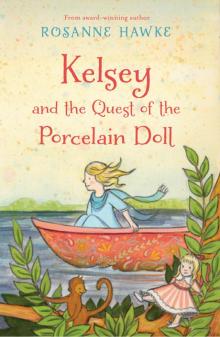 Kelsey and the Quest of the Porcelain Doll
Kelsey and the Quest of the Porcelain Doll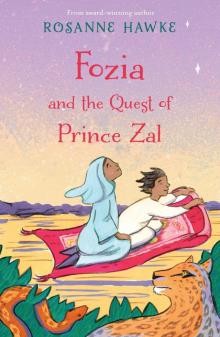 Fozia and the Quest of Prince Zal
Fozia and the Quest of Prince Zal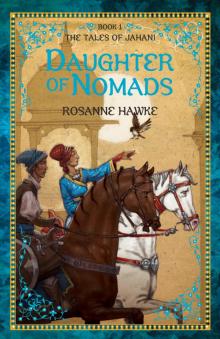 Daughter of Nomads
Daughter of Nomads The Truth About Peacock Blue
The Truth About Peacock Blue Taj and the Great Camel Trek
Taj and the Great Camel Trek The War Within
The War Within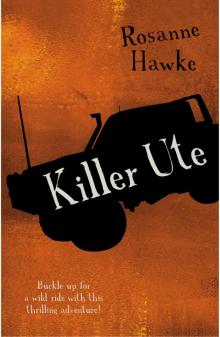 Killer Ute
Killer Ute Shahana
Shahana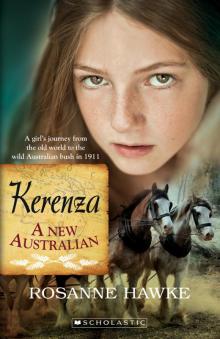 Kerenza: A New Australian
Kerenza: A New Australian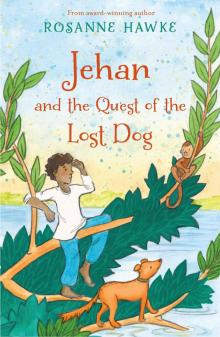 Jehan and the Quest of the Lost Dog
Jehan and the Quest of the Lost Dog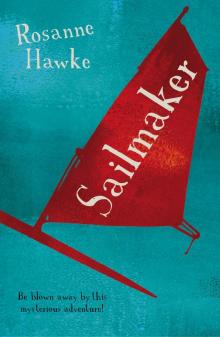 Sailmaker
Sailmaker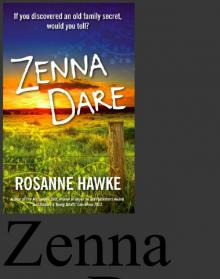 Zenna Dare
Zenna Dare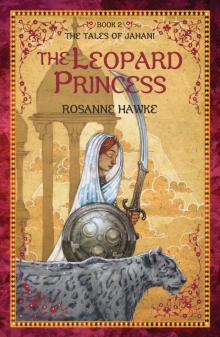 The Leopard Princess
The Leopard Princess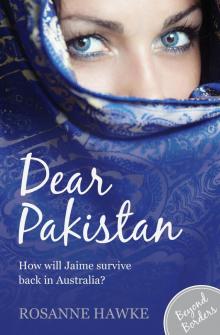 Dear Pakistan
Dear Pakistan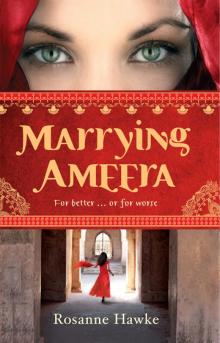 Marrying Ameera
Marrying Ameera Finding Kerra
Finding Kerra Spirit of a Mountain Wolf
Spirit of a Mountain Wolf